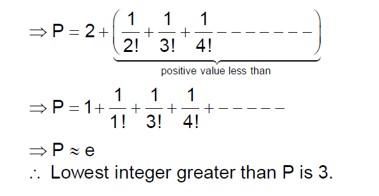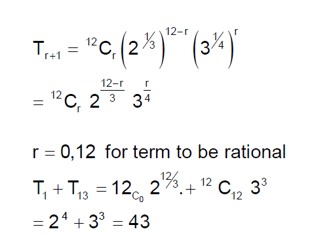Binomial Theorem
Get insights from 76 questions on Binomial Theorem, answered by students, alumni, and experts. You may also ask and answer any question you like about Binomial Theorem
Follow Ask QuestionQuestions
Discussions
Active Users
Followers
New answer posted
4 months agoContributor-Level 9
We know, ?C? is max at middle term
a = ¹?C? = ¹?C? = ¹?C?
b = ²?C_q = ²?C?
c = ²¹C? = ²¹C? = ²¹C?
a/¹?C? = b/(²?C?) = c/(²¹C?) = 20/10, 21/11
New answer posted
4 months agoContributor-Level 10
(1 + x)¹? + x(1+x)? + x²(1+x)? + . . + x¹?
= (1-x)¹? [1-(x/(1+x))¹¹]/[1-x/(1+x)]
⇒ (1+x)¹¹ - x¹¹
Coefficient of x? is ¹¹C? = 330
New answer posted
4 months agoContributor-Level 10
120.00
(1 + x + x² + x?)? = (1 + x)? · (1 + x²)?
Coefficient of x? = ?C?·?C? + ?C?·?C? + ?C?·?C?
= 15 + 90 + 15
= 120
New answer posted
4 months agoContributor-Level 10
Sum S = Σ (2r+1)? C? = 2Σr? C? + Σ? C? = 2n2? ¹ + 2? = n2? + 2? = (n+1)2?
(n+1)2? = 101 * 2¹? ⇒ n=100.
2 [ (n-1)/2] = 2 [ (99)/2] = 2 [49.5] = 2*49 = 98.
New answer posted
4 months agoContributor-Level 10
Coeff of x? in (2+x/3)? is? C? 2? (1/3)?
Coeff of x? in (2+x/3)? is? C? 2? (1/3)?
? C? 2? / 3? =? C? 2? / 3?
(n!/ (7! (n-7)!) * 2 = (n!/ (8! (n-8)!) * (1/3).
2 / (n-7) = 1 / (8*3).
48 = n-7 ⇒ n=55.
New answer posted
4 months agoContributor-Level 10
T? = ¹? C? (xsinα)¹? (acosα/x)? = ¹? C? x¹? ²? sin¹? α a? cos? α
For term independent of x, 10-2r=0 ⇒ r=5.
T? = ¹? C? sin? α a? cos? α = ¹? C? (sin2α/2)? a?
This is the greatest when sin2α=1.
the greatest value = ¹? C? (a/2)? = 10!/ (5!)².
¹? C? = 252.
252 (a/2)? = 252.
(a/2)? = 1 ⇒ a=2.
New answer posted
4 months agoContributor-Level 10
Coeff of x? in (x²+1/bx)¹¹: T? = ¹¹C? (x²)¹¹? (1/bx)? = ¹¹C? x²²? ³? b?
22-3r=7 ⇒ 3r=15 ⇒ r=5. Coeff is ¹¹C? /b?
Coeff of x? in (x-1/bx²)¹¹: T? = ¹¹C? (x)¹¹? (-1/bx²)? = ¹¹C? x¹¹? ³? (-1)? b?
11-3r=-7 ⇒ 3r=18 ⇒ r=6. Coeff is ¹¹C? (-1)? /b? = ¹¹C? /b?
¹¹C? /b? = ¹¹C? /b? ⇒ b = ¹¹C? /¹¹C? = (11-5+1)/5 = 7/5. This differs from the solution.
Let's check the exponents again.
x? : 22-2r-r=7 => 22-3r=7 => 3r=15 => r=5. Correct.
x? : 11-r-2r=-7 => 11-3r=-7 => 3r=18 => r=6. Correct.
The given solution has b=1.
New answer posted
4 months agoContributor-Level 10

According to question, 10 – 2r = 0 ⇒ r = 5
T6 is maximum, when f(x) = is maximum.
For maximum,
Taking an Exam? Selecting a College?
Get authentic answers from experts, students and alumni that you won't find anywhere else
Sign Up on ShikshaOn Shiksha, get access to
- 66k Colleges
- 1.2k Exams
- 681k Reviews
- 1800k Answers



